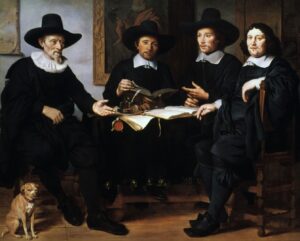It was June when I shared an overview of the 12 disciples of Jesus. I noted that they all became apostles and went forth to spread the word. It got me thinking about why they were all men. The culture of the time clearly put women in a lower position than men. I also knew of the powerful roles certain women played in Jesus’ life. So, I set out to
find a definitive list. I was naïve! There are many lists. Many authors have selected a few women who define what their thesis is. But one listed 89 women in the New Testament. Don’t stop reading! I am not writing a thesis or a term paper!
I have chosen not to reiterate the stories of the ones we all know: Mary, Jesus’ mother; Mary Magdalene, the devoted follower; Elizabeth, John the Baptist’s mother; Mary and Martha, sisters of Lazarus, who illustrate different ways to follow Jesus; and the unnamed poor widow who could only give two small coins to the temple and whom Jesus watched and used as an example of what giving is all about. I am going to tell you about three women, Phoebe, Dorcas, and Joanna. Their stories are significant.
Phoebe is very interesting and appears once (Romans 16:1-2). Whole books and many articles have been written about her. Authors speculate about her and her role in the early church. What is definite is that she was a notable leader of the church in Cenchreae where she ministered to the poor, catered to strangers and passers-by, and fulfilled the needs of prisoners. She was not a wealthy individual but was one of a cohort of women in the early church performing these roles. Paul trusted her to carry his letter from Cenchreae near Corinth to Rome where he called on the Romans to welcome her. Paul describes her as “sister,” “deacon,” “minister,” and “patron.” Those words in Greek would be understood by his readers. While she was not an ordained minister, she was a leader. This passage has been often used to justify women in leadership roles in the Christian Church. Ironically, Paul also wrote that “women should remain silent…but must be in submission.” Beyond this, little is known about Phoebe. Either she was
burned at the stake for her beliefs, or she died of natural causes!
Dorcas aka Tabitha (Acts 9:36-42) lived in the ancient city of Joppa. She is described as a disciple. She followed Jesus’ teachings about how to treat others having the “gift of hospitality.” She cared for the needs of widows. There is no evidence that she, herself, was ever married or was a widow. One of her skills was sewing. She would often make robes and other clothing for the poor. She was “hands-on” in her charitable work. She was much loved by her
community. One day she got sick and died. Her body was washed by those who loved her. The close -knit community of Christians knew Peter was in the area and he was summoned to heal her. When he arrived, they escorted him to the upper room where she was placed, which was filled with items she had made for them. He sent them all out and prayed. He commanded her to rise. She opened her eyes and, seeing Peter, she sat up and rose to her feet. Peter
called the believers into the room where there was a joyous reunion. From her we learn faith without using your talents is not true. One writer pointed out that “God isn’t calling the qualified, but he qualifies the called. Even Peter, once a fisherman, now performs miracles.”
Joanna (Luke 8:1-3) and (Luke 24:1-12). She is identified as the wife of Chuza. A Jew, he was a steward to Herod Antipas. One of Jesus’ main disciples after he cured her of unnamed evil spirits, she accompanied Jesus and his disciples, and provided for them from her resources. She found a life for herself beyond being the “wife of” someone
everyone should know. She discovered her own ministry. She was one of the first at the empty tomb with Mary and the other women. Some speculate that because of her court connections, Joanna may have been the source of Luke’s “inside information” about Herod Antipas.
So where have all the women gone? They never left. Jesus knew the important intellectual, service, and advocacy roles women would play in his ministry and the spread of his mission. It was society’s norms of his time, that kept men from describing women as primary contributors to Jesus’ mission. Yes, women then and now “reflect the radical love of Christ!”


